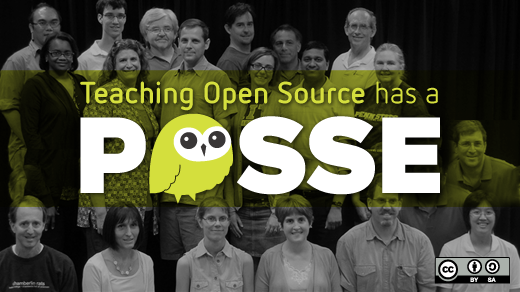(This post is the third in the "Voices of POSSE" series, a collection of interviews conducted at this year's Professors' Open Source Summer Experience, held in Raleigh, NC on July 23-24.)
Prof. Richard Ilson thinks the traditional software engineering course is broken, its blueprints horribly outdated. Working on large software development projects is more complicated than most people think, he said, and teaching students to do it with textbooks alone just doesn't prepare them for professional positions.
"The principles of software engineering are not like the principles of electrical engineering," said Ilson, who teaches software engineering at The University of North Carolina at Charlotte. "It's like an art, a seat-of-the-pants thing."
In other words, it requires gut instinct as much as technical skill. And that makes it all the more difficult to teach.
Luckily, at this year's Professors' Open Source Summer Experience (POSSE), Ilson found a group that shares his sentiments and understands the challenges associated with teaching software engineering in traditional college classrooms.
POSSE is a two-day conference for college educators who want to understand how open source tools and principles can help teach students something elusive: What it feels like to work in software development.
This year's POSSE hosted 16 college educators that all agreed they require something more than textbooks and instructors' manuals to help their students learn. They need strong peer support networks--communities of practice--with whom they can share teaching tips, ideas, concerns, challenges, and successes. POSSE is the crucible in which these communities take shape.
With newfound allies in this year's POSSE cohort, Ilson shared his frustrations. Nearly 50 students are currently enrolled in his fall courses. How could he oversee all these budding code artists and ensure they're honing their individual instincts?
Worries like these are all too familiar for Dr. Mihaela Sabin of the University of New Hampshire at Manchester. But being surrounded by others who share her concern is refreshing, she said.
"Many faculty share similar challenges," said Sabin, who's teaching Advanced Web Authoring this year. "Listening to your own reverberated by others is reassuring, and proves that this kind of event has a very good potential for creating a community of practice."
"We're all in the same place," she said.
Introducing her students to open source projects has been the best way to expose them to contemporary technologies, frameworks, and programming languages, Sabin said.
"I'm totally sold on open source," she said. "You continuously learn, as you use it, as you contribute to it. And it's very transparent, so it's very pedagogical. And at the same time, it's at the cutting edge of technology."
From her POSSE friends, Sabin hoped to learn strategies for helping students become fluent with these tools--especially when she herself didn't have the open source experience needed to offer students the advice they sought.
Dr. Nannette Napier of Georgia Gwinnett College in Lawrenceville, GA, sympathized with Sabin. She's overhauling her software development course, and knows open source is the key to making sure it reflects today's engineering environment. But she needed help tapping the open source communities that will give her students valuable experiences.
"How do I personally understand what needs to happen to at least get started?" she said. "I have no framework for everything that needs to happen."
Napier's course is the first in the college's core set of programming courses. These courses are strategically layered, Napier said, so students matriculating through them develop the understanding that programming is not just about writing code. It's also about maintaining documentation, managing teams, juggling milestones, and learning to be flexible enough to use multiple tools when solving complex problems.
Partnering with open source projects provides students a window into how this type of software is developed, Napier said. However, these groups use a diverse set of tools, she said, and quickly learning to use them is tough for both students and professor.
"There's just so many aspects of being involved in a community," Napier said.
So many, in fact, that Dr. Karl Wurst of Worcester State University in Worcester, MA, has developed a course dedicated to as many of them as possible. His freshman seminar--It's An Open Source World!--emphasizes community as a critical component of the open source way.
"There are communities out there that are creating things, and [students] can be part of that," Wurst said. "That's my biggest goal for this course."
Wurst is excited to introduce students to the open source movement, he said, because he suspects many of them have narrow impressions of it.
"I don't know that they know 'open source' means anything other than 'you can download it for free,'" he said. "Can they be made aware that there's actually a channel that goes the other way?"
No doubt Wurst's new friends will want to know what he's accomplished this fall. As this year's POSSE conference drew to a close, attendees immediately began discussing ways they could sustain their precious community of practice as they returned to schools throughout the country. Now they're organizing monthly meetings using the technologies they discovered together, and laying the groundwork for a disciplinary commons.
For Wurst, these ties may have been the most important outcome of the entire weekend.
"That's more valuable than anything else we're doing here," he said. "We're building a community."







Comments are closed.